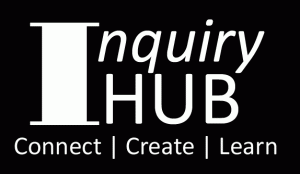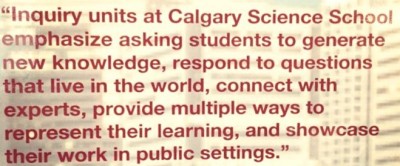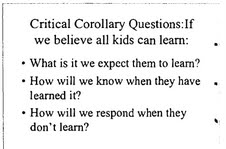The HUB Blog is “The Inquiry Hub‘s Professional Learning Blog”. As such, it is a place to share what we have learned, what we are learning, and what we are still trying to figure out.
One of the most exciting things about being an educator is sharing great learning moments with our students… discovering answers to questions that neither teacher nor student knew beforehand. In that way, it is vital for educators to see that they are not just teachers, but equally as important, they are also learners. After all, we are in the ‘business of learning’ and modeling fearless learning is probably one of the most influential ways we can instil curiosity and a love of learning in our students.

One of the key premises of the Inquiry Hub is that we will help students develop their own questions, based on their interests, and then help them find the answers. With that in mind, I’ll share some resources based on a couple key questions that I have asked myself:
Where can I find some of the best resources on inquiry based learning?
– And –
How can we best foster a culture of curiosity and meaningful inquiry in our community?
Hopefully the links below will be a start, but the best use of this blog won’t be just as a repository of useful links and resources, but rather a ‘living’ documentation of our insights, reflections and our own inquiry into what our learning community is exploring at the school. Connect. Create. Learn.
Here are some great resources for inquiry based teaching and learning. (Previously shared here.)
These are for sharing, discussing, and questioning. They are conversation starters between colleagues in schools and students in classrooms. Attempting to use these resource in isolation is a recipe for frustration and exhaustion. Together, ‘we’ are much smarter, more effective, potent.
Connect! – The Professional Learning Journal of the Calgary Science School. Follow along as the staff at CSS continue to learn and share.
Discipline-Based Inquiry Rubric – from The Galileo Educational Network. It takes a while for planning with this rubric to become a habit of mind.
Exemplary Learning and Teaching posters – These are in every classroom at CSS, and the students and staff live and breathe these concepts! Here is the CSS blog post on this!
Exemplary Collaboration – Staff at CSS have just developed this!
Examining Student Work: A Collaborative Inquiry into Exemplary Teaching and Learning produced by the Calgary Science School.
Calgary Science School Strategic Plan 2011/2012 – “Centre of Exemplary Teaching and Learning through Collaboration, Research and Innovation”

Work that Matters: This guide is for teachers. It explains how to design and run projects for students that begin with an enquiry and end with a tangible, publicly exhibited product.
Introduction to Inquiry Based Learning: A great website by Neil Stephenson, with excellent examples from CSS!
Points of Inquiry: A Framework For Information Literacy and The 21st Century Learner.
Blog posts by Shelley Wright: Life in a Technology Embedded Classroom: Science, Life in a 21st-Century English Class, Why I Love Project Based Learning and Flipping Bloom’s Taxonomy.
Blog posts by Chris Wejr: Power of a Student-Designed Curriculum and 6 BIG Assessment (AFL) Practices.
A Step-by-Step Guide to the Best Projects: But we are in Canada, so instead of #1. State Standards, think ‘Learning Outcomes’.
Inquiry learning – from knowledge to understanding – 6 minute video by Vic Hygate – How do you use inquiry learning to move from knowledge to understanding?
Environmental Inquiry: A Pedagogical Framework on Natural Curiosity – a resource for teachers.
Challenge Based Learning: Take action to make a difference.
Describing 16 Habits of Mind: ”Habit of Mind” means having a disposition toward behaving intelligently when confronted with problems, the answers to which are not immediately known.
Next Steps: Creating a focus on Learning. Good notes on the value of culture.

And now here is what I believe is THE MOST IMPORTANT RESOURCE! One that we have to collectively create in our school:
An inquiry driven,
collaborative culture,
that is pervasive throughout our school,
including parents, educators, and students.
Hopefully this blog will provide a space for us to share parts of our learning journey in our efforts to build such a community.


